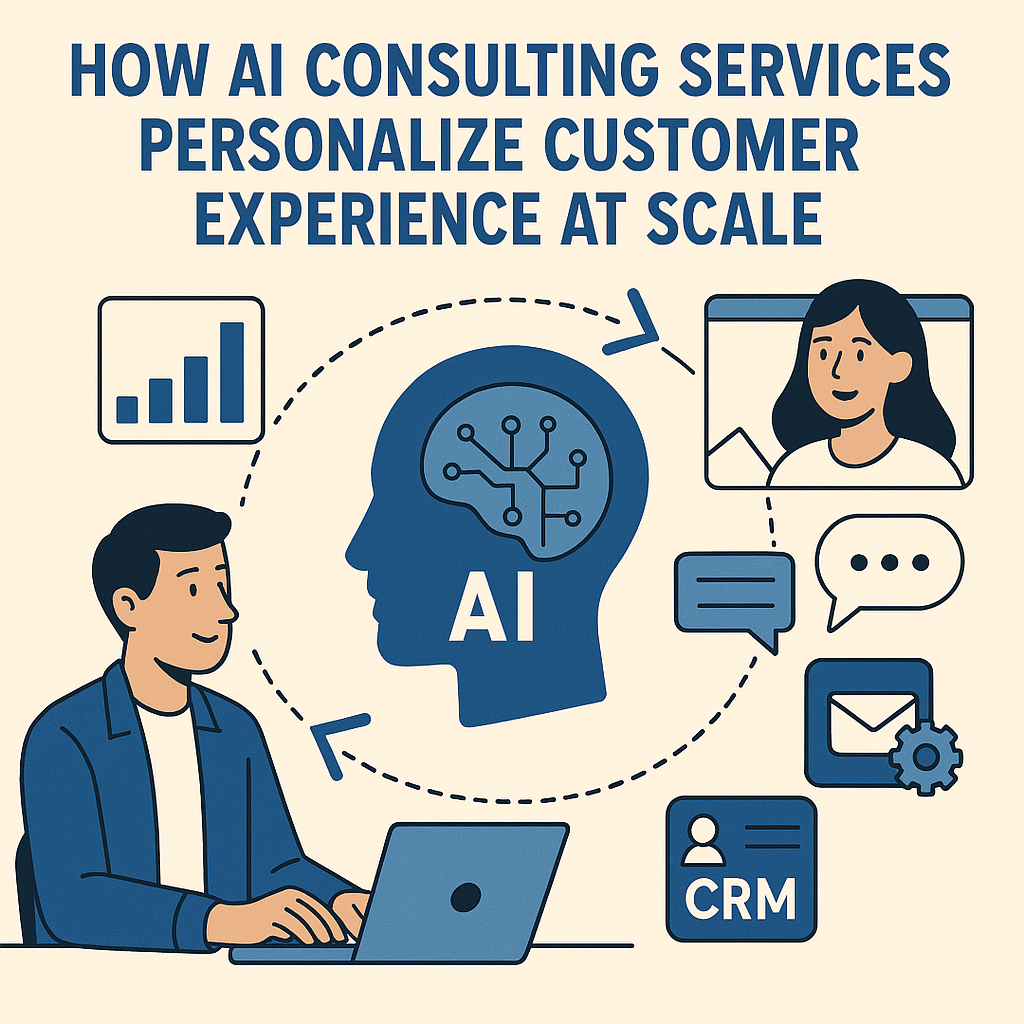AI consulting services are changing the way businesses interact with customers by making personalization possible—even when you’re serving millions.
That’s not just marketing fluff—it’s happening in real time across industries.
From retail and finance to healthcare and entertainment, companies are unlocking new levels of connection with their users using data-backed strategies powered by artificial intelligence.
And guess what?
It’s no longer about the tech itself.
It’s about how that tech fits your specific business goals.
Let’s break it down.
The Problem with One-Size-Fits-All
Ever get a recommendation for a product you’d never buy?
That’s what happens when companies rely on generic marketing campaigns.
Back in 2019, I worked with a mid-sized eCommerce brand that sent the same newsletter to 40,000 customers.
Click-through rate? Below 2%.
Then we brought in an AI consultant.
Within weeks, they integrated machine learning tools to analyze purchase history, browsing behavior, and cart abandonment patterns.
By month three?
Their emails were tailored to individual behavior, and the click-through rate jumped to over 9%.
The difference?
AI-driven personalization—at scale.
AI consulting services enabled that shift from shouting into the void to having targeted, meaningful conversations.
What Exactly Do AI Consultants Do?
Let’s be real: AI is complicated.
Consultants exist to make it less complicated—and more impactful.
They don’t just tell you to “use AI.”
They show you how to use it to solve your specific problems.
Whether it’s automating your customer support, optimizing inventory forecasting, or enhancing user journeys—consultants design and implement the actual roadmap.
They’re the bridge between raw data and actual business results.
And more importantly, they customize the tools to fit your needs, not the other way around.
From Data to Experience: How AI Gets Personal
Here’s a real example.
A boutique hotel chain was struggling with customer retention.
They had loyalty programs, but guests didn’t return.
An AI consultant dug into the data—booking patterns, review sentiments, seasonal behaviors.
Turns out, guests who got custom suggestions for nearby experiences had a 42% higher chance of rebooking.
The AI system, once in place, recommended local activities, dining options, and even pillow preferences based on past stays.
That’s not just good customer service.
That’s smart personalization at work.
And none of it would’ve been possible without someone interpreting the data through a business lens.
It’s Not About More Data. It’s About the Right Data
Most companies are sitting on a goldmine of unused data.
Call logs.
Chat history.
Page visits.
But data without direction is just noise.
AI consultants know what to look for—and how to clean, structure, and train systems on it.
One healthcare startup had hundreds of feedback forms from patients.
They didn’t know how to use it.
The consultant brought in a natural language processing tool to identify recurring issues in patient experience.
That analysis reshaped their onboarding process and improved patient satisfaction scores by 31% in six months.
The takeaway?
Insights don’t come from data alone.
They come from interpreting the data with precision and purpose.
Real-Time Adaptation: The Game Changer
AI-powered experiences aren’t just personalized once.
They evolve in real time.
Let me give you a quick example from a fashion brand I collaborated with in 2021.
A new visitor lands on the site and checks out summer dresses.
By the time she hits the homepage again?
She’s greeted with personalized lookbooks, curated accessory bundles, and “Style Your Summer” blog suggestions.
All based on one browsing session.
AI consulting services designed that entire dynamic content strategy.
And the best part?
It kept adapting.
If she suddenly browsed boots next week?
The homepage would reflect that shift instantly.
This level of real-time agility isn’t luck—it’s smart systems set up with expert help.
Cutting Costs Without Cutting Corners
A common myth?
AI is only for the big players.
Truth is, it’s even more powerful for growing businesses.
In 2022, a regional fitness chain implemented chatbot-based AI for member inquiries.
Before the change, they had a 4-person team handling basic FAQs—gym hours, trial class availability, refund rules.
Post-AI integration, that workload was cut by 80%.
Not only did it save money, but it also freed up staff to focus on member retention and upselling.
A consultant led the rollout, fine-tuned the NLP model, and ensured it mirrored the brand’s tone of voice.
That’s cost-efficiency without compromise.
The Ethical Edge of Smart Systems
Let’s not ignore the elephant in the room: data privacy.
A good AI consultant doesn’t just optimize—they safeguard.
They implement data governance frameworks that ensure customer trust isn’t traded for performance.
For example, one fintech firm I worked with had deep concerns around sensitive customer data.
The consultant ensured AI models only accessed anonymized insights.
The result?
Hyper-personalization with zero compromise on compliance.
This balance is what separates hasty automation from intelligent transformation.
What to Look for in an AI Consultant
Not all consultants are created equal.
Look for someone who:
- Understands both tech and business goals
- Has a proven track record in your industry
- Can explain complex things simply
- Prioritizes transparency and privacy
- Builds scalable, long-term solutions
If they’re pushing tools instead of solving problems, that’s a red flag.
A strong AI consulting partner starts by understanding your customer—not just your codebase.
Final Thoughts
AI consulting services aren’t just about technology.
They’re about transforming how you build relationships—with scale, speed, and sensitivity.
Whether you’re running a D2C startup or managing a legacy enterprise, the right AI strategy can unlock a new tier of customer experience.
But only if it’s crafted by someone who gets the big picture.
Because personalization isn’t just a nice-to-have anymore.
It’s the new standard.
And with the right consulting, it’s a standard you can scale.
